- Home
- Nick Hornby
High Fidelity Page 6
High Fidelity Read online
Page 6
Tonight, it really doesn’t matter either way. Marie could come up to me as I was leaving and ask if I wanted to go for something to eat; or I could get home, and Laura would be sitting there, sipping tea and waiting nervously for absolution. Both of these daydreams sound equally attractive, and either would make me very happy.
Marie takes a break after an hour or so. She sits on the stage and swigs from a bottle of Budweiser, and some guy comes out with a box of cassettes and puts them on the stage beside her. They’re £5.99, but they haven’t got any pennies, so really they’re six quid. We all buy one from her, and to our horror she speaks to us.
“You enjoying yourselves?”
We nod.
“Good, ’cause I’m enjoying myself.”
“Good,” I say, and that seems to be the best I can do for the moment.
I’ve only got a tenner, so I stand there twiddling my thumbs while the guy fishes around for four-pound coins.
“You live in London now, is that right?” I ask her.
“Yup. Not far from here, actually.”
“You like it?” Barry asks. Good one. I wouldn’t have thought of that.
“It’s OK. Hey, you guys might be the sort to know. Are there any good record shops up around here, or do I have to go into the West End?”
What’s the use of taking offense? We are the sort of guys who would know about record shops. That’s what we look like, and that’s what we are.
Barry and Dick almost fall over in their haste to explain.
“He’s got one!”
“He’s got one!”
“In Holloway!”
“Just up the Seven Sisters’ Road!”
“Championship Vinyl!”
“We work there!”
“You’d love it!”
“Come in!”
She laughs at the onslaught of enthusiasm.
“What d’you sell?”
“Bit of everything good. Blues, country, vintage soul, new wave…”
“Sounds great.”
Somebody else wants to talk to her, so she smiles nicely at us and turns round. We go back to where we were standing.
“What did you tell her about the shop for?” I ask the others.
“I didn’t know it was classified information,” says Barry. “I mean, I know we don’t have any customers, but I thought that was a bad thing, not, like, a business strategy.”
“She won’t spend any money.”
“No, course not. That’s why she was asking if we knew any good record shops. She just wants to come in and waste our time.”
I know I’m being stupid, but I don’t want her coming to my shop. If she came into my shop, I might really get to like her, and then I’d be waiting for her to come in all the time, and then when she did come in I’d be nervous and stupid, and probably end up asking her out for a drink in some cack-handed roundabout way, and either she wouldn’t catch my drift, and I’d feel like an idiot, or she’d turn me down flat, and I’d feel like an idiot. And on the way home after the gig, I’m already wondering whether she’ll come tomorrow, and whether it will mean anything if she does, and if it does mean something, then which one of us it will mean something to, although Barry is probably a nonstarter.
Fuck. I hate all this stuff. How old do you have to get before it stops?
When I get home there are two answering machine messages, one from Laura’s friend Liz and one from Laura. They go like this:
Rob, it’s Liz. Just phoning up to see, well, to see if you’re OK. Give us a ring sometime. Um…I’m not taking sides. Yet. Lots of love, bye.
Hi, it’s me. There are a couple of things I need. Can you call me at work in the morning? Thanks.
Mad people could read all sorts of things into either of these calls; sane people would come to the conclusion that the first caller is warm and affectionate, and that the second doesn’t give a shit. I’m not mad.
FIVE
I CALL Laura first thing. I feel sick, dialing the number, and even sicker when the receptionist puts me through. She used to know who I am, but now there’s nothing in her voice at all. Laura wants to come around on Saturday afternoon, when I’m at work, to pick up some more underwear, and that’s fine by me; we should have stopped there, but I try to have a different sort of conversation, and she doesn’t like it because she’s at work, but I persist, and she hangs up on me in tears. And I feel like a jerk, but I couldn’t stop myself. I never can.
I wonder what she’d say, if she knew that I was simultaneously uptight about Marie coming into the shop? Laura and I have just had a phone call in which I suggested that she’d fucked up my life and, for the duration of the call, I believed it. But now—and I can do this with no trace of bemusement or self-dissatisfaction—I’m worrying about what to wear, and whether I look better stubbly or clean-shaven, and about what music I should play in the shop today.
Sometimes it seems as though the only way a man can judge his own niceness, his own decency, is by looking at his relationships with women—or rather, with prospective or current sexual partners. It’s easy enough to be nice to your mates. You can buy them a drink, make them a tape, ring them up to see if they’re OK…there are any number of quick and painless methods of turning yourself into a Good Bloke. When it comes to girlfriends, though, it’s much trickier to be consistently honorable. One moment you’re ticking along, cleaning the toilet bowl, and expressing your feelings and doing all the other things that a modern chap is supposed to do; the next, you’re manipulating and sulking and double-dealing and fibbing with the best of them. I can’t work it out.
I phone Liz early afternoon. She’s nice to me. She says how sorry she is, what a good couple she thought we made, that I have done Laura good, given her a center, brought her out of herself, allowed her to have fun, turned her into a nicer, calmer, more relaxed person, given her an interest in something other than work. Liz doesn’t use these words, as such—I’m interpreting. But this is what she means, I think, when she says we made a good couple. She asks how I am, and whether I’m looking after myself; she tells me that she doesn’t think much of this Ian guy. We arrange to meet for a drink sometime next week. I hang up.
Which fucking Ian guy?
Marie comes into the shop shortly afterward. All three of us are there. I’m playing her tape, and when I see her walk in I try to turn it off before she notices, but I’m not quick enough, so I end up turning it off just as she begins to say something about it, and then turning it back on again, then blushing. She laughs. I go to the stockroom and don’t come out. Barry and Dick sell her seventy quid’s worth of cassettes.
Which fucking Ian guy?
Barry explodes into the stockroom. “We’re only on the guest list for Marie’s gig at the White Lion, that’s all. All three of us.”
In the last half-hour, I have humiliated myself in front of somebody I’m interested in, and found out, I think, that my ex was having an affair. I don’t want to know about the guest list at the White Lion.
“That’s really, really great, Barry. The guest list at the White Lion! All we’ve got to do is get to Putney and back and we’ve saved ourselves a fiver each. What it is to have influential friends, eh?”
“We can go in your car.”
“It’s not my car, is it? It’s Laura’s. Laura’s got it. So we’re two hours on the tube, or we get a minicab, which’ll cost us, ooh, a fiver each. Fucking great.”
Barry gives a what-can-you-do-with-this-guy shrug and walks out. I feel bad, but I don’t say anything to him.
I don’t know anybody called Ian. Laura doesn’t know anybody called Ian. We’ve been together three years and I’ve never heard her mention an Ian. There’s no Ian at her office. She hasn’t got any friends called Ian, and she hasn’t got any girlfriends with boyfriends called Ian. I won’t say that she has never met anyone called Ian in the whole of her life—there must have been one at college, although she went to an all-girls school—but I am almost certain that since
1989 she has been living in an Ianless universe.
And this certitude, this Ian-atheism, lasts until I get home. On the windowsill where we put the post, just inside the communal front door, there are three letters amidst the takeout menus and the minicab cards: a bill for me, a bank statement for Laura…and a TV license reminder for Mr. I. Raymond (Ray to his friends and, more pertinently, to his neighbors), the guy who until about six weeks ago lived upstairs.
I’m shaking when I get into the flat, and I feel sick. I know it’s him; I knew it was him the moment I saw the letter. I remember Laura going up to see him a couple of times; I remember Laura…not flirting, exactly, but certainly flicking her hair more often, and grinning more inanely, than seemed to be strictly necessary when he came down for a drink last Christmas. He would be just her type—little-boy-lost, right-on, caring, just enough melancholy in his soul to make him appear interesting. I never liked him much then, and I fucking hate him now.
How long? How often? The last time I spoke to Ray—Ian—the night before he moved…was something going on then? Did she sneak upstairs on nights when I was out? Do John and Melanie, the couple in the ground-floor flat, know anything about this? I spend a long time looking for the change-of-address card he gave us, but it’s gone, ominously and significantly—unless I chucked it, in which case strike the ominous significance. (What would I do if I found it? Give him a ring? Drop round, and see if he’s got company?)
I’m starting to remember things now: his dungarees; his music (African, Latin, Bulgarian, whatever fucking world music fad was trendy that week); his hysterical, nervous, nerve-jangling laugh; the terrible cooking smells that used to pollute the stairway; the visitors that used to stay too late and drink too much and leave too noisily. I can’t remember anything good about him at all.
I manage to block out the worst, most painful, most disturbing memory until I go to bed, when I hear the woman who lives up there now stomping around and banging wardrobe doors. This is the very worst thing, the thing that would bring anybody (any man?) in my position out in the coldest and clammiest of sweats: we used to listen to him having sex. We could hear the noises he made; we could hear the noises she made (and there were two or three different partners in the time the three of us—the four of us, if you count whoever was in Ray’s bed—were separated by a few square meters of creaking floorboard and flaking plaster).
“He goes on long enough,” I said one night, when we were both lying awake, staring at the ceiling. “I should be so lucky,” said Laura. This was a joke. We laughed. Ha, ha, we went. Ha, ha, ha. I’m not laughing now. Never has a joke filled me with such nausea and paranoia and insecurity and self-pity and dread and doubt.
When a woman leaves a man, and the man is unhappy (and yes, finally, after all the numbness and the silly optimism and the who-cares shrug of the shoulders, I am unhappy—although I would still like to be included somewhere in the cover shot of Marie’s next album)…is this what it’s all about? Sometimes I think so, and sometimes I don’t. I went through this period, after the Charlie and Marco thing, of imagining them together, at it, and Charlie’s face contorted with a passion that I was never able to provoke.
I should say, even though I do not feel like saying it (I want to run myself down, feel sorry for myself, celebrate my inadequacies—that’s what you do at times like these), that I think things were OK in That Department. I think. But in my fearful imaginings Charlie was as abandoned and as noisy as any character in a porn film. She was Marco’s plaything, she responded to his every touch with shrieks of orgasmic delight. No woman in the history of the world had better sex than the sex Charlie had with Marco in my head.
But that was nothing. That had no basis in reality at all. For all I know, Marco and Charlie never even consummated their relationship and Charlie has spent the intervening decade trying—but failing miserably—to recapture the quiet, undemonstrative ecstasy of the nights that we spent together. I know, however, that Ian was something of a demon lover; so does Laura. I could hear it all; so could Laura. In truth, it pissed me off; I thought it pissed her off, too. Now I’m not so sure. Is this why she went? Because she wanted a bit of what was happening upstairs?
I don’t really know why it matters so much. Ian could be better at talking than me, or cooking, or working, or housework, or saving money, or earning money, or spending money, or understanding books or films; he could be nicer than me, better-looking, more intelligent, cleaner, more generous-spirited, more helpful, a better human being in any way you care to mention…and I wouldn’t mind. Really. I accept and understand that you can’t be good at everything, and I am tragically unskilled in some very important areas. But sex is different; knowing that a successor is better in bed is impossible to take, and I don’t know why.
I know enough to know that this is daft. I know, for example, that the best sex I have ever had was not important; the best sex I have ever had was with a girl called Rosie, whom I slept with just four times. It wasn’t enough (the good sex, I mean, not the four times, which were more than enough). She drove me mad, and I drove her mad, and the fact that we had the knack of being able to come at the same time (and this, it seems to me, is what people mean when they talk about good sex, no matter what Dr. Ruth tells you about sharing and consideration and pillow talk and variety and positions and handcuffs) counted for nothing.
So what is it that sickens me so much about “Ian” and Laura? Why do I care so much about how long he can go on for and how long I could go on for and what noises she made with me and what noises she makes with him? Just, I guess, this in the end: that I still hear Chris Thomson, the Neanderthal, testosterone-crazed, fourth-year adulterer, calling me a spastic and telling me he has knobbed my girlfriend. And that voice still makes me feel bad.
During the night, I have one of those dreams that aren’t really dreams at all, just stuff about Laura fucking Ray, and Marco fucking Charlie, and I’m pleased to wake up in the middle of the night, because it means stopping the dream. But the pleasure only lasts a few seconds and then everything sinks in: that somewhere Laura really is fucking Ray (maybe not exactly now, because it’s 3:56 A.M., although with his stamina—his inability to climax, ha ha—you never know), and I’m here, in this stupid little flat, on my own, and I’m thirty-five years old, and I own a tiny failing business, and my friends don’t seem to be friends at all but people whose phone numbers I haven’t lost. And if I went back to sleep and slept for forty years and woke up without any teeth to the sound of Melody Radio in an old people’s home, I wouldn’t worry that much, because the worst of life, i.e., the rest of it, would be over. And I wouldn’t even have had to kill myself.
It’s only just beginning to occur to me that it’s important to have something going on somewhere, at work or at home, otherwise you’re just clinging on. If I lived in Bosnia, then not having a girlfriend wouldn’t seem like the most important thing in the world, but here in Crouch End it does. You need as much ballast as possible to stop you from floating away; you need people around you, things going on, otherwise life is like some film where the money ran out, and there are no sets, or locations, or supporting actors, and it’s just one bloke on his own staring into the camera with nothing to do and nobody to speak to, and who’d believe in this character then? I’ve got to get more stuff, more clutter, more detail in here, because at the moment I’m in danger of falling off the edge.
“Have you got any soul?” a woman asks the next afternoon. That depends, I feel like saying; some days yes, some days no. A few days ago I was right out; now I’ve got loads, too much, more than I can handle. I wish I could spread it a bit more evenly, I want to tell her, get a better balance, but I can’t seem to get it sorted. I can see she wouldn’t be interested in my internal stock control problems though, so I simply point to where I keep the soul I have, right by the exit, just next to the blues.
SIX
EXACTLY one week after Laura has gone, I get a call from a woman in Wood Green who has some sing
les she thinks I might be interested in. I normally don’t bother with house clearance, but this woman seems to know what she’s talking about: she mutters about white labels and picture sleeves and all sorts of other things that suggest we’re not just talking about half a dozen scratched Electric Light Orchestra records that her son left behind when he moved out.
Her house is enormous, the sort of place that seems to have meandered to Wood Green from another part of London, and she’s not very nice. She’s mid-to-late forties, with a dodgy tan and a suspiciously taut-looking face; and though she’s wearing jeans and a T-shirt, the jeans have the name of an Italian where the name of Mr. Wrangler or Mr. Levi should be, and the T-shirt has a lot of jewelry stuck to the front of it, arranged in the shape of a peace sign.
She doesn’t smile, or offer me a cup of coffee, or ask me whether I found the place OK despite the freezing, driving rain that prevented me from seeing the street map in front of my face. She just shows me into a study off the hall, turns the light on, and points out the singles—there are hundreds of them, all in custom-made wooden boxes—on the top shelf, and leaves me to get on with it.
There are no books on the shelves that line the walls, just albums, CDs, cassettes, and hi-fi equipment; the cassettes have little numbered stickers on them, always a sign of a serious person. There are a couple of guitars leaning against the walls, and some sort of computer that looks as though it might be able to do something musical if you were that way inclined.
I climb up on a chair and start pulling the singles boxes down. There are seven or eight in all, and, though I try not to look at what’s in them as I put them on the floor, I catch a glimpse of the first one in the last box: it’s a James Brown single on King, thirty years old, and I begin to prickle with anticipation.

 Funny Girl
Funny Girl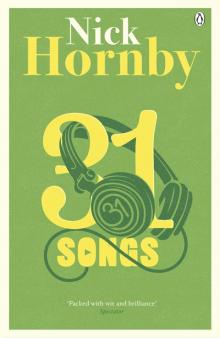 31 Songs
31 Songs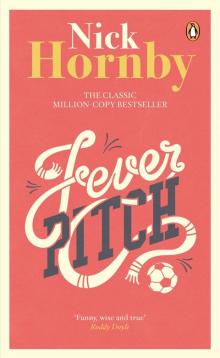 Fever Pitch
Fever Pitch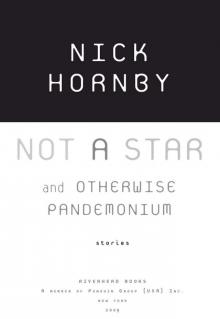 Not a Star and Otherwise Pandemonium
Not a Star and Otherwise Pandemonium The Complete Polysyllabic Spree
The Complete Polysyllabic Spree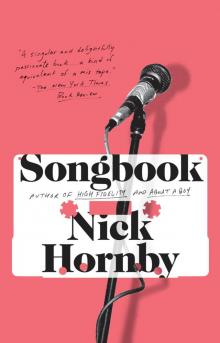 Songbook
Songbook An Education
An Education Slam
Slam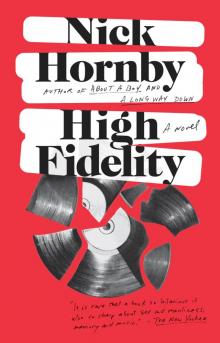 High Fidelity
High Fidelity Speaking With the Angel
Speaking With the Angel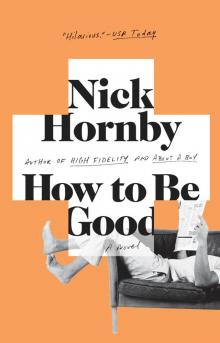 How to Be Good
How to Be Good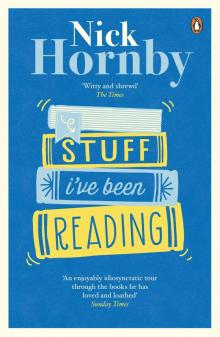 Stuff I've Been Reading
Stuff I've Been Reading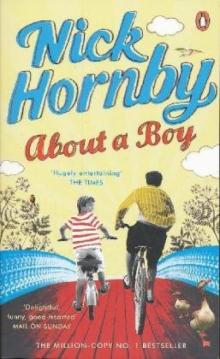 About a Boy
About a Boy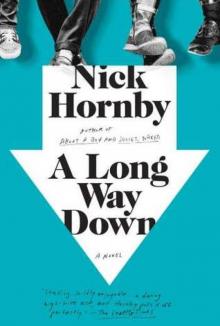 A Long Way Down
A Long Way Down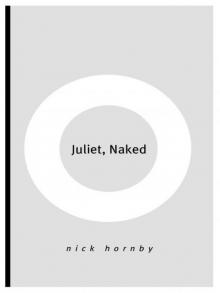 Juliet, Naked
Juliet, Naked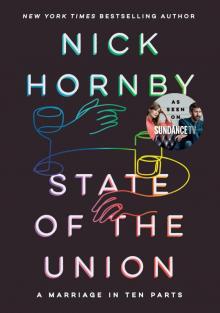 State of the Union
State of the Union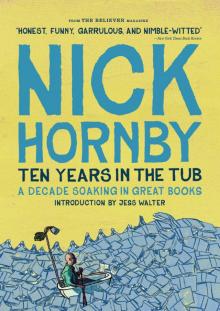 Ten Years in the Tub: A Decade Soaking in Great Books
Ten Years in the Tub: A Decade Soaking in Great Books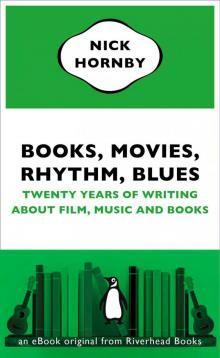 Books, Movies, Rhythm, Blues: Twenty Years of Writing About Film, Music and Books
Books, Movies, Rhythm, Blues: Twenty Years of Writing About Film, Music and Books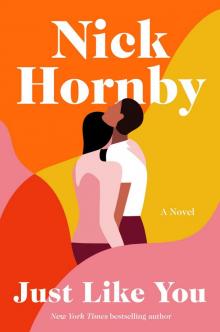 Just Like You
Just Like You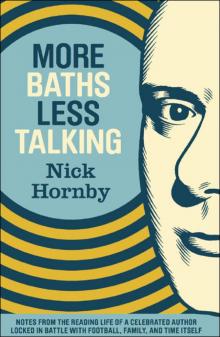 More Baths Less Talking
More Baths Less Talking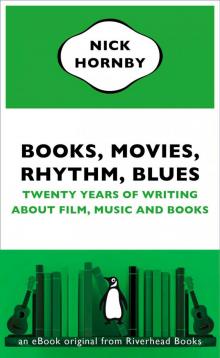 Books, Movies, Rhythm, Blues
Books, Movies, Rhythm, Blues